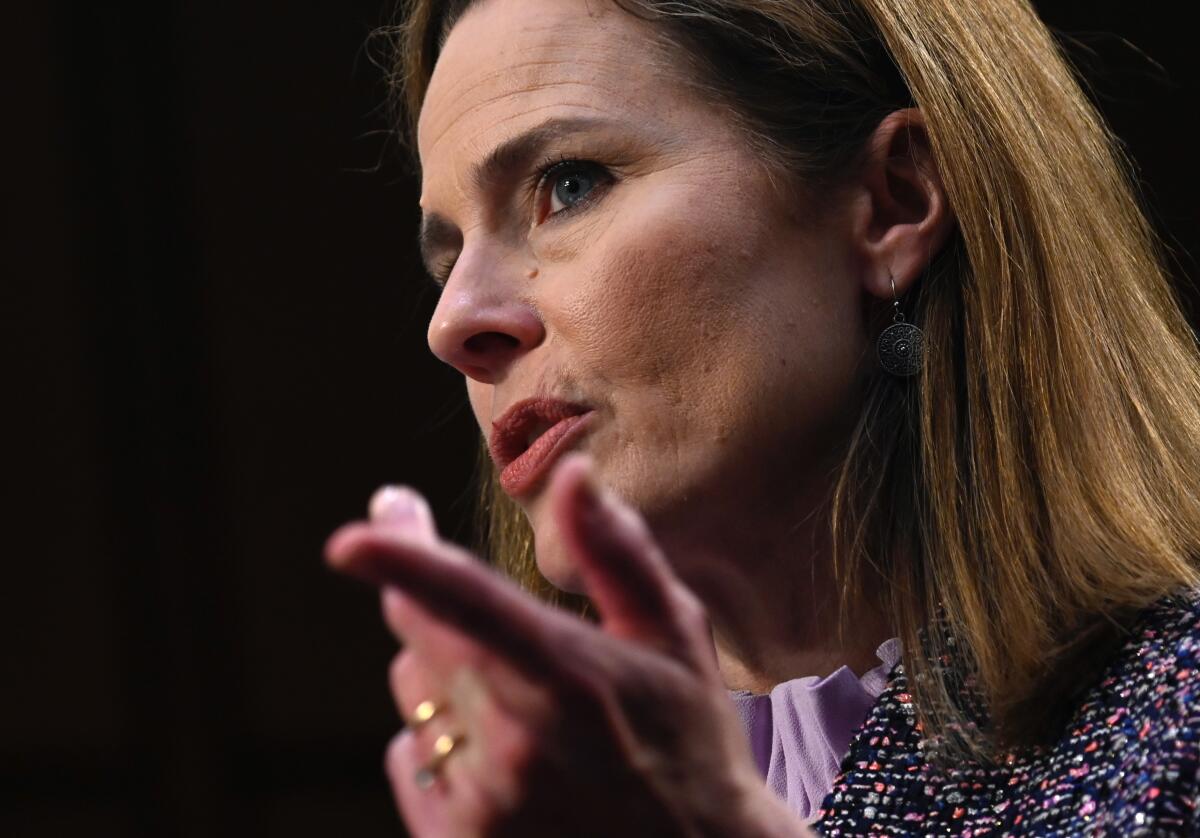Democratic senators make final pitch to slow Amy Coney Barrett confirmation hearing

WASHINGTON — In an undoubtedly losing battle to block President Trump’s nominee to the Supreme Court, Democratic senators used a final day of hearings to press their case for why Judge Amy Coney Barrett is dangerous to Americans’ healthcare and personal rights.
Barrett was not present for Thursday’s proceedings before the Senate Judiciary Committee, and the agenda called for a number of experts to testify. But the committee members spent the morning in their first real back-and-forth debate over Barrett’s qualifications, her reticence to express views, and what Democrats see as a rushed, “sham” process.
“I recognize this goose is pretty much cooked,” said Sen. Cory Booker (D-N.J.), who complained that Barrett would not commit to accepting the results of the upcoming presidential election.
Trump has not committed to a peaceful transfer of power if he loses and has said publicly that he has chosen a Supreme Court justice to back him up. Barrett declined to comment on that and other questions related to Trump or current political controversies, saying that as a judge she did not want to get dragged into the debate.
She also turned aside some senators’ request she recuse herself from any election-related case that might come before the court involving Trump.
Sen. Richard Durbin (D-Ill.) said he was afraid to ask Barrett about the existence of gravity for fear that she would decline to recognize even that.
Sen. Lindsey Graham (R-S.C.), who chairs the committee, set Oct. 22 at 1 p.m. for the panel’s vote on Barrett. Republicans have a majority, and unless some members do not attend because of illness, passage is guaranteed. Her nomination then moves to the full Senate, and the GOP has made clear it wants her approval before the Nov. 3 election.
Two Republican members of the Judiciary Committee tested positive for COVID-19 after attending a Trump-hosted ceremony for Barrett at the White House on Sept. 26. But both Sens. Mike Lee of Utah and Thom Tillis of North Carolina said their doctors declared them clear of the virus, and they attended this week’s hearings.
Sen. Richard Blumenthal (D-Conn.) sought to postpone Barrett’s confirmation. “She has been rushed in a way that has been historically unprecedented,” he said. “We’ve had inadequate time to review this nominee.”
He noted that Barrett failed to disclose some of her writings and speaking engagements that revealed strongly held views. Already, with what has been disclosed, it is clear that Barrett personally opposes abortion. She would not comment, however, in the hearings on how she would rule on the issue.
Graham insisted there was “nothing out of the norm” in the speed with which the nomination process had taken place. And he reiterated his conviction that Barrett was fully qualified for the post.
The motion to put off Barrett’s nomination lost along party lines 12-10.
Senate Majority Leader Mitch McConnell, speaking to reporters in his home state of Kentucky, said the full Senate vote on the Barrett nomination would take place as early as Oct. 23, and he said the body would remain in session until it was finished.
“We have the votes,” he said.
The committee wrapped up the week’s proceedings Thursday with outside experts commenting for and against Barrett’s nomination.
Kristen Clarke, president of the 57-year-old Lawyers Committee for Civil Rights Under the Law, said Barrett’s views were “far outside the mainstream” of jurisprudence and legal opinion.
Barrett will prove a disaster “to anyone who cares about voting rights,” Clarke said, complaining Barrett’s refusal to condemn voter suppression and intimidation “arises at one of most tumultuous times in our history.” “We’re wrestling with a pandemic, protests about unconstitutional policing practices, racial injustice and more.”
But Laura Wolk, who said she was the first blind woman to clerk at the Supreme Court, credited Barrett for her success, citing the judge’s support, compassion and deep knowledge.
“Her brilliance is matched only by her compassion, and her integrity is unassailable,” Wolk said.
“She possesses a boundless font of energy and a radical sense of love that she is ever ready to pour out upon those lucky enough to call her teacher, boss, family and friend,” Wolk said.
Another supporter, retired appellate court Judge Thomas Griffith of Washington D.C., asserted that Barrett was one of the judges who “can and do put aside party and politics.”
Also present were two representatives of the American Bar Assn.’s committee that rates judges. They said Barrett received the group’s highest rating, “well-qualified,” but not unanimously, making her the first high court nominee since Clarence Thomas not to win a unanimous “well qualified” rating.
Crystal Good, who described herself as a biracial Appalachian from West Virginia, said the Supreme Court’s support for reproductive rights enabled her, as a sexually abused 16-year-old years ago, to obtain an abortion. Otherwise, her life would have been destroyed, she said, and the Barrett nomination is making her “lose faith” in the court and its protections.
Though Democrats acknowledged they have little power to block Barrett’s confirmation, they vowed to keep fighting in hopes that public pressure might grow.
“The Republicans have the votes,” Blumenthal said. “We have the American people.”
More to Read
Get the L.A. Times Politics newsletter
Deeply reported insights into legislation, politics and policy from Sacramento, Washington and beyond. In your inbox three times per week.
You may occasionally receive promotional content from the Los Angeles Times.








